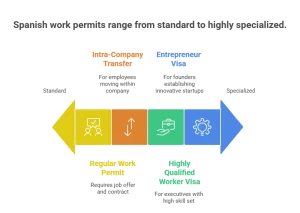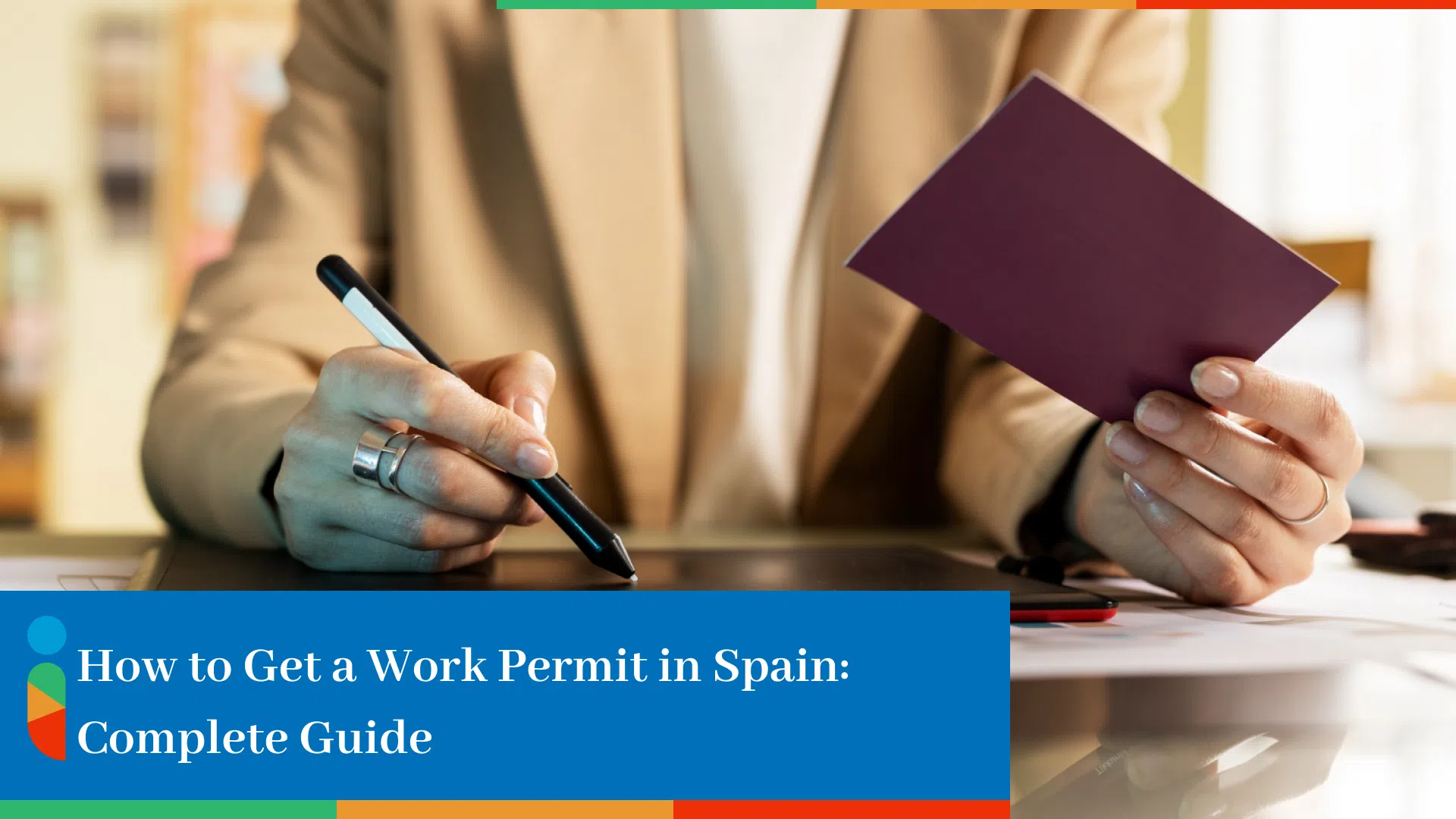With a strong job market and better quality of life, it’s no wonder that professionals from all over the world are setting their sights on Spain to grow and establish their careers.
But before you start living the work life of your dreams, you need to have something essential. And that is your Spain work permit. While EU and EEA citizens can work freely, non-EU nationals must apply for a valid work permit before starting employment.
According to Spain’s Ministry of Inclusion, Social Security, and Migration, over 285,000 new work permits were issued in 2024, signaling a 17% jump from the previous year. What this surge actually reflects is Spain’s increasing openness to international professionals.
In this blog post, we will explain the entire process of getting your work permit along with the exact steps to secure your legal right to work in Spain.
Understanding the Spain Work Permit
Earn legally, pay your taxes, and enjoy the full range of employee rights in the country with your Spain work work permit.
Spain’s residence visa system is closely tied to it, which means your right to live and work here is often processed together.
There are different types of visas in Spain that let you work in the country. These types vary depending on your profession, contract type, and duration of employment.
What is a Spain Work Permit?
It is legal authorization. Usually linked to a valid employment visa in Spain. The work permit is issued to non-EU citizens to work for a specific employer within Spanish territory. Spain’s immigration authorities and the Ministry of Labour jointly grant it.
Who Needs a Work Permit?
If you’re from outside the EU or EEA and planning to work, freelance, or start employment in Spain, you will need one.
Some exceptions exist, such as family members of EU citizens, accredited researchers, and university faculty. But most foreign professionals must go through the standard permit application process.
Types of Work Permits in Spain
Spain has structured its system to accommodate different categories of professionals. This helps in making sure that everyone from tech founders to company transferees can find a fitting visa type.
Your exact professional requirements and eligibility will affect which permits and employment visa in Spain are right for you.

Highly Qualified Worker Visa
Under Spain’s Entrepreneurs Law 14/2013, the highly qualified worker visa gets faster processing.
This visa is for you if you are an executive, manager, or a specialist with a high skill set and earning a salary that is above the minimum wage in Spain. That amount, as of now in 2025, is €1,134/month.
Regular Work Permit
This is the standard work permit if you are employed under a Spanish company contract.
You need a formal job offer, a valid employment contract, your employer’s authorization while being compliant with Spain labor laws to apply for one.
Intra-Company Transfer Permit
The intra-company transfer permit is often part of a broader employee relocation process happening within the same company.
If you are an employee who is moving from a company’s foreign branch to its Spanish subsidiary, this permit is for you.
Entrepreneur Visa
Non-EU citizens setting up a business in Spain, establishing startups or ventures that will contribute to the local economy or introduce unique innovation need to have an entrepreneur visa.
Spain encourages innovation, and this visa is proof. It’s for non-EU citizens establishing startups or ventures that contribute to Spain’s economy or introduce unique innovation. It’s both a residence and work authorization, ideal for founders who want to live where they build.
Eligibility and Requirements
With different visa types, the eligibility for Spain work permit varies. Still, the criteria remains similar for most applications.
General Eligibility Criteria
As for the general eligibility criteria, you need to have a job offer secured from a Spanish employer, who should have authorization from the provincial labour office.
Other than that, you need to submit the proof of your professional qualifications. This enables the employer to show that there was no suitable candidate available locally before they offered you that position.
Document Checklist
Your application will require these documents:
- A completed EX-03 application form
- Your passport with validity for more than 3 months
- Two passport photos
- Work authorization from employer
- TIE card in Spain, applied after arrival
- Medical certificate and police record issued within last 6 months
Step-by-Step Spain Work Permit Process
Employer and employee, both, are involved in the Spain work permit process. These are the usual steps:
Step 1: Employer Applies for Authorization
Your employer will apply by submitting an authorization request to the provincial Ministry of Labour office. The approval usually takes anywhere between 1 to 2 months, depending on the existing backlog.
Step 2: Employee Applies for Work Visa
Once your employer receives approval, you will apply for your work permit visa in Spain at your local Spanish consulate in your home country. This includes submitting your documents, attending an interview, and giving biometrics.
Step 3: Wait for Processing and Decision
The Spain work permit processing time is usually between one to three months. During this period, you can track your Spain work permit status on the Ministry’s official website.
Step 4: Arrival and Registration in Spain
After your visa is approved, you’ll enter Spain and complete final steps like applying for a Foreigner’s Identity Number (NIE) and your TIE card within 30 days. Register with Spain’s Social Security Fund (TGSS) before starting work.

Spain Work Permit Cost and Validity
Your nationality and visa type affect the total Spain work permit visa cost. The Consulate of Spain in USA shares this general overview that categorizes the amount for USA citizens, Canadian citizens, and other nationalities. It also highlights the varied amount for employed work visas versus the self-employed visas:
| Permit Type | USA Citizens | Canadian Citizens | Other Nationalities |
| Employed Work Visa | €167 | €100 | €80 |
| Self-Employed Visa | €238 | €674 | €80 |
Most permits are valid for one year, renewable for up to two years at a time. After five years of continuous residence, you can apply for long-term residency that will give you near-permanent rights to live and work in Spain.
Common Challenges & How You Can Overcome Them
Many applicants face documentation delays, employer approval issues, or processing bottlenecks while applying for their Spain work permit.
From document errors to long wait times, a few common issues can slow you down but none are deal-breakers if you are well-prepared.
Common Issues
Applicants often face delays in employer authorization or get tripped up by incomplete paperwork.
Some job categories may also not be open to foreign applicants unless listed in Spain’s official employment catalog.
How to Overcome These Challenges
Always confirm your document checklist with your nearest Spanish consulate. Track your Spain work permit status online to stay updated.
And if the administrative back-and-forth feels overwhelming, consider working with EOR services in Spain who will handle compliance, sponsorship, and onboarding on your behalf.
After Receiving Your Spain Work Permit
Follow these administrative steps once your permit gets approved:
Apply for Residence Card and Social Security
Apply for your TIE card and register with the national Social Security system. This also makes you eligible for enrolling in Spain’s public healthcare coverage.
Family Reunification
After one year of legal residence, you can apply for family reunification. Your spouse, children, and dependents can join you in Spain. Depending on their visa type, they may also be allowed to work.
Conclusion
Spain offers multiple work permit options for global professionals who are looking to build their careers in one of Europe’s most vibrant economies.
Keep your documents ready, stay updated on your application, and partner with experts who can guide you through each step.
Spain’s structured work visa system simplifies international hiring through the support of trusted partners like Iberia EOR, helping global employers manage compliance, payroll, and relocation with ease.
FAQs
How Long Does It Take to Get a Spain Work Permit Approved?
The average approval time is between one to three months, depending on the consulate and employer authorization status.
Can I Switch Jobs After Obtaining a Spain Work Permit?
Yes, but you will need to reapply for authorization under your new employer. The permit is usually tied to your specific job contract.
What Is the Validity of A Spain Work Permit?
It is usually valid for one year and renewable for two years. After five years, you can apply for long-term residence.
Can Family Members Work in Spain Under My Permit?
Yes, family members can often work if they hold valid residence cards that allow employment rights.
What Is the Difference Between a Work Visa and A Work Permit?
A work permit gives you legal permission to work. Whereas, a visa allows you to enter Spain to live and work.





